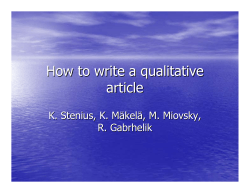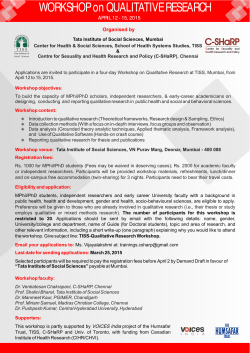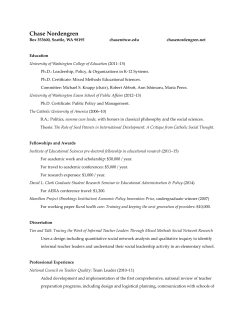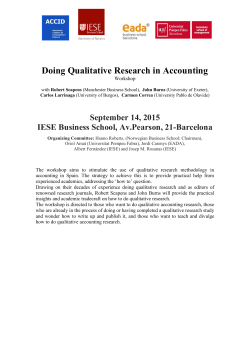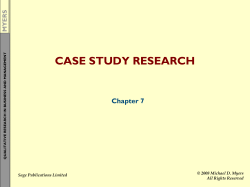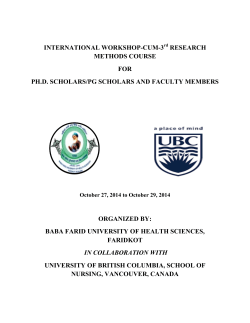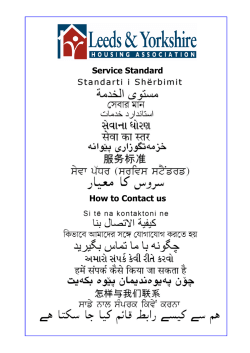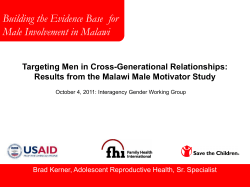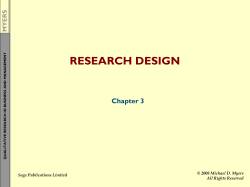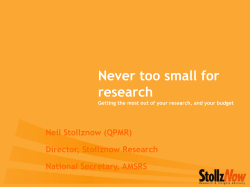
the full Workshop Programme
Qualitative Longitudinal Research – an advanced workshop 8th June 2015, Beech Grove House, University of Leeds Workshop aims Qualitative longitudinal research presents particular complexities and challenges relating to its design, to managing fieldwork and associated ethics, and to effective data analysis. This workshop explores some of these challenges and offers conceptually informed practical strategies for addressing issues arising throughout QL research from inception to analysis and explanation. We will explore issues in conceptualising time and designing QL methods to inform our understanding of temporal processes. We will address issues in fieldwork with particular reference to access, sampling and retention in longitudinal research. Such issues raise diverse ethical challenges which will be explored and exemplified through cases of research with marginalised groups. We also look at conventional and innovative methods for generating qualitative longitudinal data, including the effectiveness of utilising new digital communications technologies. We then explore QL data, looking at primary and secondary analytic strategies, and at the potential for data re-use more generally. Presentations are made by experts in the field. These will be interspersed with participatory practical sessions in which delegates can explore research design for capturing temporal processes, and bring to bear their own research interests very directly in a practical QL data analysis session. Plenary session will draw out and explore key themes from the day and facilitate discussion and debate amongst participants and presenters. Who is the workshop for? The workshop is suitable for academic and non-academic researchers who are contemplating, or already using, qualitative longitudinal research. The workshop caters for those from different disciplines, although the presentations will all have a social science focus. The level is intermediate to advanced, and participants will gain most where they have a solid grounding in, and familiarity with, qualitative research methods. The workshop is suitable for people at different career stages, from PhD/postdoctoral researchers to senior academics, as well as those working in third sector and policy sectors wanting to learn more about qualitative longitudinal research. 1 Programme 9.30 Registration (and coffee) 9.45 Sarah Irwin Introduction to day 9.50 Bren Neale Adding time into the mixː an introduction to qualitative longitudinal research 10.20 Nick Emmel Access, sampling, and retention in qualitative longitudinal research 10.50 Ruth Patrick Sustaining samples and encountering ethical ‘speed bumps’: reflections on researching over time 11.20 Workshop activity 1: Designing QL research (facilitated by Bren Neale) 12.00 Plenary – Panel made up of morning speakers / All 12.30 1.15 LUNCH Susie Weller Digital communication technologies: some potentials and pitfalls for QL research 1.45 Anna Tarrant A methodological strategy for working effectively across qualitative longitudinal datasets as a secondary researcher 2.15 Sarah Irwin 2.45 Workshop activity 2: Analysing QL data (facilitated by Sarah Irwin and Anna Tarrant) Qualitative longitudinal research and social class dynamics /TEA 3.30 Joanna Bornat Revisiting reuse: personal reflections of an oral historian 4.00 Plenary – Panel made up of afternoon speakers/ All 4.30 End Families, Life Course and Generations Research Centre; Sociology and Social Policy, University of Leeds; in conjunction with the White Rose DTC 2 Abstracts follow, and then details of (and instructions for) the participatory workshops Abstracts Professor Bren Neale, University of Leeds, “Adding Time into the Mixː an introduction to Qualitative longitudinal Research” The talk will set out the contours of QL enquiry and explore what it means to add time into the mix of a qualitative study. Time can be understood in two waysː as the medium through which we carry out an enquiry, bringing a range of methodological and ethical challenges to research design, and as a theoretical concept and substantive topic that drives the generation and analysis of data. Different ways of ‘slicing’ time – past-present-future, biography-history, intensive-extensive - will be outlined and ways of ‘capturing’ and working with time in a QL study will be demonstrated. This will include the use of Framework to condense temporal data and work iteratively across cases, themes and waves. Conceptually, the session will enable a greater appreciation of time as the lynchpin through which to understand the dynamic relationship between individual agency and broader social structuresˑ and hence to reach a greater understanding of the factors that shape varied life course trajectories. Dr. Nick Emmel, University of Leeds, “Access, sampling, and retention in qualitative longitudinal research” Qualitative longitudinal (QL) research presents particular challenges in negotiating access, choosing cases, and maintaining our relationships with participants through research. In addition, because QL research engages with time methodologically and substantively, we are obliged to think about and respond to the dynamic relationships between researchers and researched, and the ways in which the subjects in our research design and determine their responses to the changing natural, social, and practical circumstances in which they live. The talk will consider how time affects the recruitment and engagement with a sample. It will consider how change (and staying the same) through time provide important opportunities for description, interpretation and explanation from our research. I will focus attention on 'subjects in process' together with 'relations in process'. Ruth Patrick (University of Leeds), Sustaining samples and encountering ethical ‘speed bumps’: reflections on researching over time This paper explores two critical aspects of qualitative longitudinal research (QLR): sustaining contact with participants over time, and the ethical dimension. Firstly, this paper explores and considers the strategies and issues with attempts to sustain a research sample over time. Discussion will focus on practical strategies for trying to sustain contact with individuals, particularly those who might be characterised as ‘hard to reach’ and so, perhaps, even more difficult to keep in contact with over time. As well as exploring ethical issues bound up with such strategies, this paper will also consider the ways in which the activities which sustaining contact demands can be viewed more positively. In particular, the scope for these activities to generate valuable data will be explored, as well the ways in which they can improve the relational dynamic between the research participant(s) and researcher. The second part of 3 this paper will turn to a consideration of the particular ethical challenges implicit to research relationships in QLR. Following a brief outline and overview of key issues and literature in this field, the paper will provide an opportunity to think through the sorts of ethical challenges and dilemmas that can be encountered in QLR. Throughout, reference will be made to a recent small-scale qualitative longitudinal study into the lived experiences of welfare reform. In concluding, reflections from the field will be shared, reflections which centre on the rich potential of QLR, and its particular compatibility for studies that seek to generate improved understandings of how policies are experienced and the impact(s) they have. Dr. Susie Weller, NCRM and University of Southampton, “Digital communication technologies: some potentials and pitfalls for QL research” The use of digital communication technologies has become increasingly commonplace in social research. Yet, sparse attention has been paid to the potential of such technologies in Qualitative Longitudinal (QL) research. This paper explores the implications of introducing one such technology, video-telephony (e.g. Skype, FaceTime, Google Hangouts), as a new mode of data collection into an established QL study that has primarily generated data using biographical interviews conducted in participants’ homes. The paper draws on the ‘Your Space’ project; a decade-long study following the lives of up to 52 young people from across Britain. This paper focuses in particular on the most recent phase of the project. Funded as one of the eleven ESRC National Centre for Research Method’s ‘Methodological Innovation Projects’ it aims to investigate the potential of video telephony as: (i) a means of keeping in touch with a sample of young people via short ‘catch-up’ interviews; and (ii) an alternative way of conducting case study intensive interviews. The project takes a participatory approach using participant feedback on their interview experiences, and adopts an interactionist framework to consider the implications of shifting from physical co-present interviewing to remote modes on key issues for QL research such as sample maintenance, research relationship continuity, and rapport. Dr. Anna Tarrant, University of Leeds, “A methodological strategy for working effectively across qualitative longitudinal datasets as a secondary researcher” This presentation describes a methodological strategy that was employed to conduct qualitative secondary analysis across two distinct but comparable qualitative longitudinal datasets from the Timescapes archive; ‘Intergenerational Exchange’ and ‘Following Young Fathers’. The re-use and analysis of data from two or more individually conceived yet linked projects is a complex process requiring effective working across projects (Irwin and Winterton, 2011), as well as a detailed understanding of the original research aims and design. The strategy consisted of three, sometimes overlapping phases; a synthesis and review of outputs from the archived studies; Data sharing and knowledge exchange and the conduct of qualitative secondary analysis. With reference to debates about the ethics of conducting QSA (Neale and Bishop, 2012) and ‘epistemological distance’ (Mauthner et al 1998; Mason, 2007), I consider a) the methodological challenges and affordances of working collaboratively with researchers who share their datasets, b) the conceptual insights and theoretical possibilities that are opened up through these processes and c) how secondary 4 analysis can aid in the process of generating access to the research field and refining or generating new research questions. Professor Sarah Irwin, University of Leeds,“Qualitative longitudinal research and social class dynamics” Qualitative longitudinal research is uniquely placed to access the temporal dimensions of classed inequalities as they play out through biographical time in changing social structural contexts. In the presentation I will reflect on analysis of data from two QL projects, one looking at young people’s evolving educational trajectories and expectations, and the other exploring the experiences and perspectives of parents across diverse socio-economic circumstances. In both cases QL data sheds light on the classing of biographies and on wider dynamics of social class. I discuss issues and challenges in qualitative longitudinal analysis, particularly with reference to accessing such temporal dynamics. QL is sometimes celebrated for capturing the open-endedness and never finalised character of social life and relationships, but it can also facilitate theory building and testing. I reflect on the contribution of qualitative longitudinal research to enhancing social explanation. Professor Joanna Bornat, open University: “Revisiting reuse: personal reflections of an oral historian” Looking back over more than a decade of engagement with the practice of re-using data, one’s own and other’s, I reflect on what was learned from these experiences from the perspective of an oral historian. An oral history approach to archived data benefits methodologically and empirically from a dual heritage: a position on the boundary between history and sociology which gives access to both disciplines. A secondary analysis of archived interviews which identifies new evidence, asks new questions, explores research strategies and engages with the subjectivities of researcher and researched, inevitably leads to critical evaluations and reflection. In this paper I draw on experiences in re-using my own and other people’s data, highlighting different approaches to secondary analysis. Two projects. The Oldest Generation in the Timescapes programme and the South Asian Geriatricians project, run in parallel yet independent of each other, both engaging in re-use but both very different in focus, are considered as well lessons learned from a recent scoping exercise involving locally archived oral history collections. Examples of cross-fertilisation of ideas are pointed up, as well as observed limitations. The paper concludes with suggestions for future re-users of archived data. 5 Participatory workshop sessions There are two participant workshops through the day. A) Designing QL research B) Analysing QL data. Here we will explore and develop analytic themes and questions drawing on qualitative data which will be provided for you. You are not expected to bring your own data. However, you might wish to do so. If so, please read the text at the end of these pages for instructions.The exercise is an engaging way to provide and receive feedback on participants’ own work in progress. How to apply? To allow for effective interaction and participation we limit places to 40 delegates. We therefore recommend early registration. To apply for a place, fill in an application form and return it to us via post or email. Electronic copies of the form can be downloaded from XXXX The workshop fee is £40. PhD students will have costs met by the ESRC through its doctoral training programme, so they need only return the completed application form. Other delegates need to pay for their place through the online store, as well as returning a completed application form. Participants need to meet their own travel and subsistence costs. Date and Venue: 8th June 2014 Beech Grove House, University of Leeds, Leeds, LS2 9JT Stay another day! On the 9th June we are running a day conference at the University of Leeds: “Researching relationships across generations and through time”; details will be available very soon on the FLaG website http://www.flag.leeds.ac.uk (You will need to arrange your own accommodation). 6 Instructions for workshop B, if you intend to submit some sample data. We will provide examples of data for small group discussions, allowing delegates to draw out and discuss strategies for tackling complexities in the analysis of QL data. However, we also want to take the opportunity to facilitate the sharing of extracts from delegates’ own research data. If you are interested in doing so, please send us part of an interview transcript, or other suitable empirical material, generated in the course of your research and which you can share with others. This could be up to a couple of pages, and should be no more than 800 words. (Feel able also to bring samples of visual or other data). Also provide: - A brief (one paragraph) account of the research project design, and how the data fits within it A very brief summary of the data extract (This will be photocopied and supplied to a small group on the day – about 4 individuals). In advance of the workshop reflect on the following questions. A small group of workshop participants will also be asked this question on the day, with reference to your data extract. i. ii. iii. What are the issues of potential analytic interest within this data extract? What are the complexities of analysing this (kind of) data? What analytic strategies are the most effective? This is necessarily an artificial undertaking, but one which can generate productive discussion. Do not forget to anonymise your material. Please submit the data extracts and summary information to Jennie Hall j.hall@leeds.ac.uk by 11th May. . 7
© Copyright 2025
